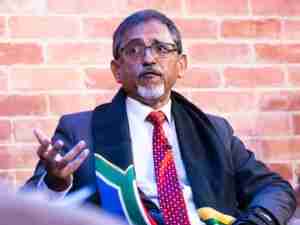G-20 Checks In for Detox as Germany Seeks Backing for Free Trade
By: Jeff Black, Rainer Buergin and Josh Wingrove | Mar 15 2017 at 05:27 AM | International Trade
Currency complaints and the threat of trade wars are making global economic affairs the most toxic they’ve been in years. So the world’s top policy makers are heading for a spa treatment.
This weekend in the German resort of Baden-Baden, finance ministers and central bank governors of the world’s 20 key economies are going to be asked to reaffirm the principles of free trade, open markets and prudent regulation, Bundesbank President Jens Weidmann said on Wednesday.
And despite the current populist surge against globalization, agreement among the Group of 20 is still a possibility, as U.S. Treasury Secretary Steven Mnuchin still has few fleshed-out policy positions from his boss President Donald Trump or staff to advance them. China, Germany and the rest of the club have little interest in wrecking the consensus that’s helped steer the world economy out of the financial crisis.
“It could happen that the G-20 ends up fracturing because of the U.S. shift to bilateralism, but it’s difficult to know because all this is still in Trump’s mind,” said Steven Barrow, head of G-10 strategy at ICBC Standard Bank in London. “It’s the under-the-radar stuff that can be the things where the G-20 is most effective, in terms of actual policy.”
Beyond the headline statements, the work agenda Germany set out for the Group of 20 this year will ruffle few feathers and, quite possibly, get something done. From long-term work on global tax evasion to an initiative on investment in Africa, the country is playing down controversies over the euro exchange rate, its current-account surplus and the oncoming onslaught against trade imbalances from the Trump administration.
Flashpoints
Although the main event of Germany’s G-20 presidency is the leaders’ summit in Hamburg in July, the finance chiefs and central bankers meeting gives German Finance Minister Wolfgang Schaeuble an opportunity to showcase his home region. Baden-Baden, a spa town since the Roman era—where the water bubbles up as hot as 154 degrees Fahrenheit—lies on the northern edge of the Black Forest, close to the French border.
The centerpiece of any G-20 meeting is a document that sets out pledges on how the global economy is going to be run. As the U.S. is the linchpin of the system, under Trump, the rules of that game seem set to change eventually.
“In order to strengthen national resilience, the German presidency is seeking an agreement on a set of principles in Baden-Baden,” Weidmann said at a conference on Wednesday in Frankfurt. “G-20 members should remain committed to the principle of open markets and cross-border trade.”
Mnuchin is set to focus on a line that commits members not to artificially weaken their currencies in order to gain trade advantages. Since even in an era when quantitative-easing policies do just that, no country admits to it, this point isn’t seen as being controversial.
Trade may prove to be a more difficult agenda item, and that’s where the major uncertainty for the U.S.’s partners lie, according to a senior Canadian official involved in the talks.
Border Tax
Officials in Baden-Baden may take the view that a so-called border tax on imports as considered by the Trump administration runs counter to the G-20 pledge to “avoid all forms of protectionism.” In Washington, German Chancellor Angela Merkel is said to be planning to tell the U.S. president on Friday that such a policy would prompt retaliatory measures, including higher tariffs for American companies, according to Der Spiegel magazine.
And even though China’s trade policy is still being identified as a “problem,” Premier Li Keqiang on Wednesday played down the tension between the world’s two largest economies.
“We don’t want to see a trade war,” Li said at a press conference in Beijing after the close of the annual National People’s Congress.
But with little from Trump’s trade agenda yet in legislation, the more relevant discussion may be about the current state of negotiations over the financial rule book know as Basel III, as well as how the Trump administration’s pledge to roll back regulation squares with it.
Financial Regulation
Germany’s suggestion here is to use a global check of financial regulation to make whatever the U.S. does with the Dodd-Frank act—as its post-crisis measures to increase bank resilience are known—consistent with international standards, according to a person familiar with the discussions.
“What needs to be done now is to conduct a structured review of the effectiveness and efficiency of reforms without watering down the resilience of the financial system,” Bundesbank Vice President Claudia Buch said on Monday.
Germany has already claimed progress on other areas of its agenda, such as the “Compact for Africa,” citing talks on investment with countries including Ivory Coast, Morocco and Rwanda. Finance Minister Wolfgang Schaeuble has spoken of the need to boost structural reforms to raise growth potential in the global economy and push forward on clamping down on tax evasion.
In other words: Amid rhetoric that the world’s multilateral trading system is breaking down in an era of populism, Germany is carrying on regardless. That’s a positive for investors trying to gauge upcoming volatility, as long as governments aren’t sticking their heads in the sand when it comes to the causes of discontent, according to Martin Enlund, chief analyst at Nordea Markets in Stockholm.
“The current setup is not the only possible equilibrium and if some party seeks to renegotiate some of these trade deals, that wouldn’t create a total breakdown,” he said. “For the Germans, it’s ‘don’t mention the war’ basically, and to try to do something constructive in the forum.”








